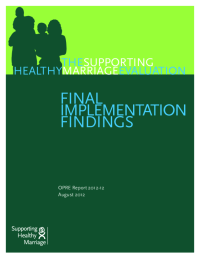Final Implementation Findings from the Supporting Healthy Marriage Evaluation
The Supporting Healthy Marriage (SHM) evaluation was launched in 2003 to test the effectiveness of a skills-based relationship education program designed to help low-income married couples strengthen their relationships and, in turn, support more stable and more nurturing home environments and more positive outcomes for children. The evaluation is led by MDRC, in collaboration with Abt Associates and other partners, and is sponsored by the Department of Health and Human Services.
The SHM evaluation includes a rigorous random assignment research design that compares outcomes for families who are offered SHM’s services with outcomes for a similar group of families who are not offered SHM services but can access other services in the community. The evaluation also includes this implementation study documenting how eight local programs delivered SHM’s services. The SHM program offers a voluntary, yearlong package of relationship and marriage education services for low-income married couples who have children or are expecting a child. The model has three complementary components: group workshops based on structured curricula; supplemental activities to build on workshop themes; and family support services to address participation barriers, connect families with needed resources, and reinforce curricular themes. This report presents final findings from the SHM implementation study, the characteristics of couples who enrolled, and their participation in the program.
Key Findings
- Local programs implemented the SHM model in adherence with established guidelines. Program designers and evaluators consider the implemented programs a fair field test of the SHM model. The core marriage education workshops were implemented consistently across program locations, but there was more variation in implementation of the other two program components.
- Couples engaged in SHM services and continued participating over time. Ninety-one percent of couples participated in at least one program service. On average, couples completed 27 hours of services across the three components, and those who initiated attendance remained engaged for approximately eight months.
- Multiple strategies supported the implementation process. Written curricula, protocols, and performance benchmarks established expectations for the content, frequency, and quality of SHM services. Technical assistance teams held programs accountable for working toward their goals, and they offered assistance to improve programs’ performance over time.
- Couples who enrolled are a diverse and relatively disadvantaged group. Most couples who enrolled in SHM had low or modest income; many are Hispanic; and more than half reported thinking that their marriage was in trouble in the past year.
- SHM services were implemented in diverse agency settings. Host agencies include community-based organizations, private for-profit entities, a hospital, and a university. Within the broad parameters of the program model, these agencies played an important role in shaping implementation.
While this study was not designed to directly test how different implementation strategies affect program performance or participation rates, the experiences of the SHM programs indicate that multiple implementation strategies can be employed to address challenges that low-income families face in staying connected to long-term, voluntary programs. A companion report, The Supporting Healthy Marriage Evaluation: Early Impacts on Low-Income Families, shows that the program produced a pattern of small, positive effects on multiple aspects of couples’ relationships.






